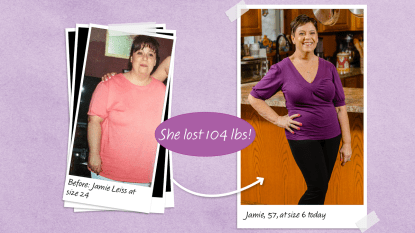How to Bounce Back From Anxiety, Stress, Anger, and Grief

When life throws you for a loop, it’s okay if you don’t know what comes next. Read on for expert advice on how to cope with the stress and anxiety of change.
You’re no stranger to change, yet when it shows up in your life — whether it’s a small but significant shift or a total upheaval — it can trigger an onslaught of emotions. Depending on the situation, you might feel fear or anticipation or hope or grief or everything all at once.
“When you’re going through a transition, there’s a middle period before you establish a new set of roles, routines and relationships, in which you’re letting go of the past,” says professor emerita of counseling psychology Nancy K. Schlossberg, EdD, author of Overwhelmed: Coping with Life’s Ups and Downs ($14.24, Amazon). And the daily demand to keep pace and push down those uncomfortable feelings only makes it harder to endure this stressful in-between phase.
“Picture a trapeze artist having to swing out, let go and free-fall before they grab onto the next thing,” adds Mary Anderson, PhD, co-author of Counseling Adults in Transition ($15.70, Amazon). “It’s the groundlessness of being in the in-between that’s really the scariest, but the key is to trust the process, go inward and find your courage, tap the strengths and values that helped you navigate changes in the past and know you will get to the other side.”
That can be easier said than done when you’re feeling lost and insecure, so FIRST tapped experts for simple strategies for facing the uncomfortable emotions arising in the midst of change. Read on to launch into your next phase with confidence!
Anxiety: Flip the playbook.
You’re ascending to a leadership role in your volunteer group, but despite how excited and honored you initially felt to be selected by fellow members, you’re increasingly on edge about being in charge. “Even a happy transition — something you really want — can evoke fear,” observes Schlossberg. “It’s scary to be doing something new, and you might be thinking, Am I really going to be able to handle this?”
Step into your new position with self-assurance by adopting a more empowering perspective: “Try to reframe it as an opportunity rather than a threatening challenge,” suggests Schlossberg. For example, instead of thinking, I have to prove myself, focus on connecting with people, learning different skills and putting your own twist on traditional ways of doing things.
Anger: Ask this question.
A recent health struggle has forced you to adjust to all sorts of unwelcome symptoms and lifestyle changes — a “new normal” you didn’t choose and deeply resent. “Things seem unfair, and you wish they were different,” observes psychotherapist Amy Morin, author of 13 Things Mentally Strong Women Don’t Do ($14.79, Amazon). “Anger can be healthy, but it’s important to acknowledge and do something with it; otherwise, it creates more problems.”
Ask yourself, Is my anger help ing or hurting me? “If your anger turns inward, like if you’re angry at yourself for not taking care of your health, it can keep you stuck,” explains Morin. In that case, she suggests shifting behaviors (like talking about happy things with a friend versus venting) to help you feel calmer. This peace puts you in the headspace to plan a way forward.
Stress: ID an anchor.
After being transferred to a new department at work, you’re struggling to acclimate to an unfamiliar space and a new set of expectations. “We all like to have some sort of structure, some routine where things are predictable and we know what’s coming next,” says Morin. “When that gets disrupted, it can send us into turmoil — and then the more stressed we feel, the more difficulties we think about, and it’s a vicious cycle that’s hard to break.”
Think about what you can control. “Maybe you can’t control your boss or your tasks, but you can control your attitude, the effort you put in or even what you eat for lunch,” says Morin. “Studies show that when you feel like you have some control in life, you can handle a lot more discomfort. Anchoring yourself in what’s controllable makes life seem instantly less chaotic.”
Grief: Make memories tangible.
Your daughter and her family just moved across the country, and while you’re already planning future visits, the sense of separation has been painful: no more picking up the grandkids after school or hosting Sunday dinners. “Sadness often helps you honor what’s been lost,” observes Morin. “As a society we’re super uncomfortable with being sad, but it can be part of the healing process — you come out stronger and appreciate life even more when you are happy again.”
How to navigate the difficult period of mourning? “Look for creative ways to remember the good times you had,” says Morin. She suggests writing a letter to the grandkids recounting your adventures together — then tucking it away until their high-school graduation. “Missing something can be a great thing — it means, I really enjoyed that time in my life,” says Morin. “You’re not dismissing your sadness or pressuring yourself to act happy — you’re honoring the experience in a way that helps you move forward.”
We write about products we think our readers will like. If you buy them, we get a small share of the revenue from the supplier.
More From Woman’s World
6 Ways to Help a Grieving Friend During the Holidays













